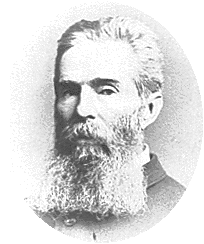
| Main index | William Darby Brind | Augustus Earle | Moby Dick |
Herman Melville (1819-1891)

Herman Melville is regarded as one of the greatest American novelists of of the 19th century. His best-known work, Moby Dick (1851), was not widely appreciated by critics or the public until after his death. Moby Dick was dedicated to the author Nathaniel Hawthorne, a friend who was idolized by Melville.
Herman Melville was born to a merchant family in New York City, in 1819, the third of eight children. His father, Allan Melvill [Herman added an "e" to the family name later in life], went bankrupt and died when Herman was 12. His mother, Maria Gansevoort Melvill, reared her family alone, with occasional help from her wealthy relatives. A bout of scarlet fever, in 1826, left Melville with permanently impaired eyesight. He attended Albany (N.Y.) Classical School in 1835. He left the school and was largely self-taught, preferring the study of literature and history to other subjects. From the age of 12, he worked as a clerk, teacher, and farmhand. In search of adventures, he shipped out, in 1839, as a cabin boy on the whaler Achushnet. He continued his naval adventures through a brief stint in the US Navy, sailing both the Atlantic and the South Pacific. Leaving the Navy, he worked as a clerk and bookkeeper in a general store in Honolulu and lived briefly among the Typee cannibals in the Marquesas Islands. In his mid-20's Melville returned to his mother's house to write about his adventures.
Typee, an account of his stay with the cannibals, was first published in Britain, like most of his works. The book sold roughly 6,000 copies in its first two years. Its sequel, Omoo (1847), was based on his experiences in Polynesian Islands, and was as successful as the first one. Throughout his career, Melville's works enjoyed a higher estimation in Britain than in America. His older brother, Gansevoort, held a government position in London, and helped to launch Melville's career.
In 1847 Melville married Elisabeth Shaw, daughter of the chief justice of Massachusetts. After three years in New York, he bought a farm, "Arrowhead", near Nathaniel Hawthorne's home at Pittsfield, Massachusetts, and the two authors became friends. Melville had almost completed Moby-Dick when Hawthorne encouraged him to change it from a mere whaling story into an allegorical novel. Inspired by Hawthorne, Melville rewrote Moby Dick into a powerful novel that, beneath the story of a whaling adventure, is a meditation on God's providence and dealings with humankind.
Melville wrote other novels around the same time as Moby Dick, including Redburn (1849), White-Jacked (1850), and The Confidence Man (1857), as well as a number of stories for Putnam's Monthly Magazine.
After unsuccessful lecture tours in 1857-60, Melville lived in Washington, D.C. He moved to New York, in 1862, where he was appointed customs inspector on the New York docks, providing him with a regular income while he continued to write. Melville's later works include Battle-Pieces and Aspects of the War (1865), John Marr and Other Sailors (1888), and Timoleon (1891). Melville's died on September 28, 1891, in New York.
Melville returned to the type of allegory that had been so successful in Moby Dick in writing his last novel, Billy Budd. Its manuscript was found in Melville's desk when he died, and it remained unpublished until 1924. A definitive edition appeared in 1962. (Since Billy Budd is still in copyright, it will be some time before it appears on The Classical Library website.)
| Main index | William Darby Brind | Augustus Earle | Moby Dick |
Source: The Classical LIbrary http://www.classicallibrary.org/melville/index.htm
Born in New York City, the son of New England merchant. He worked at odd jobs (clerk, farmhand, teacher) before sailing to the South Seas on the whaler Acushnet. He deserted his ship, lived among cannibals, mutinied on an Australian boat, then spent two years on an American boat returning to the U.S. He successfully romanticized these adventures, publishing seven novels in six years, including Moby Dick (1851), one of the masterworks of American fiction. His popularity waned, and by the time he died he was virtually forgotten. Billy Budd was his last great novel. As his writing declined, Melville sailed again, around Cape Horn to San Francisco on a clipper ship commanded by his brother.